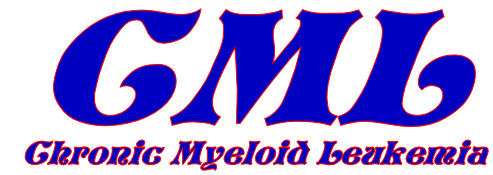


|
Chronic myeloid leukemia (CML)—also known as chronic granulocytic,
chronic myelocytic or chronic myelogenous leukemia— is a rare type of blood cancer that typically grows worse slowly. Unlike other cancers, chronic myeloid leukemia originates from the presence of a genetic abnormality in blood cells called the Philadelphia chromosome and progresses through distinct phases. In a healthy person, bone marrow makes the blood stem cells that mature into infection-fighting white blood cells, oxygen-carrying red blood cells and blood-clotting platelets. When a person has CML, too many blood stem cells develop into a type of white blood cell called granulocytes, which are abnormal and never become healthy white blood cells. In the first stages of CML, known as the chronic phase, patients show few signs of illness. In the end, however, millions of abnormal, useless white blood cells accumulate, preventing production of normal blood cells and blood-clotting platelets. Patients suffer from infections, anemia, uncontrolled bleeding and other complications that lead to death. CML usually occurs during or after middle age and rarely develops in children. Bone-marrow or stem-cell transplantation is the only known cure for the disease. The Last few years new drugs have come on the market, keeping white cells from multiplying so fast. This allows patients to live longer and healthy. |
|
How does one tell a 34 year journey, do you tell of heartbreak or joy. I guess one should try start at the beginning,
or as close as I can recall. That would be my final days in the military.
I was called into the sick parade doctor's office, he felt I was not getting well and thought I would be better off back
in civie life. I weighed about 129Lbs, my wife was very worried about me. I asked would she like to come back
to Nova Scotia? She being from the west, said she did not care. We or should I say my wife packed up everything,
the two girls, off we went. I was very ill, and no one was sure why this was, I had infections, and very weak.
Once back in Nova Scotia, I felt better, guess it was the good clean ocean air. My job in the military had me
working very close to Radio Frequency transmitters and VHF, and UHF, transmitters. Now they say that these type of
emissions cause leukaemia, how little we knew back then. I started to feel good enough to get a job and resume
my life, we had two girls they were in school, I bought a home (a fix-ER-upper), working and fixing up the
house kept me busy for a couple of years. I purchased a boat, so while I was not working around the house and my job,
I would go fishing, or just bombing along the waves. Around 1974, I found that I had less and less energy.
When I sat down, my head felt kind of foggy, I tried to work around this feeling, but I was just exhausted, this went
on for about three years, I went to a doctor but he felt I was in good shape, I tried to keep up my daily run.(5 k)
every day. It was something I use to love, now it was a total hardship. In November of 1977, I was putting my outboard motor away getting ready for winter, I managed to get the motor off the 15ft craft, but trying to get it down the slope I fell. I just could not get up and the 60hp motor was heavy on me. My dad happened to come along saw I was on the ground, helped me get the motor off and get me up. I could not put weight on my right leg. A few nights later my wife made an appointment with the doctor. He thought I may have a cyst in my hip joint. He sent me to Halifax, NS, to the ER. The nurses came in and took blood, did a brief check up, then we waited for blood results, back in those days it was hours to get a blood report back from the lab. The ER was not like it is today, with fancy little rooms, they had curtain type screens to give a small bit of privacy. I was laying on the bed and the nurses were out in the area, I overheard one nurse say to the other, my gosh "I've never seen a white blood cell count that high." The other nurse said “what's the count?” 350,000 was the reply. The doctor came in, he was a orthopedic doctor, as I was there with a bad hip. He said to me I am turning your case over to a haematology doctor. You will be admitted, a few hours later I was on the 8th floor in the Old Victoria General Hospital, hey it was not that old then. In the next few days, I was subjected to many many blood tests, I figured they were trying to drain me. If I remember correctly I had to have 2 complete blood tests a day, I am not sure of this but it strikes me that they took about 6 viles from me each time. This was about three weeks before Christmas. I was in a room with an older gentleman. I still remember his name. He was one of the oldest living blacksmiths in the Valley, He had what they called granulocytic leukaemia. He had some pills with him, I watched him take them an a while later a nurse would bring around meds and he would take them. I told the nurse, off to the side, that I thought he was taking the same meds, this is a very serious medication, It was called back then Myleran (bulsufan). I was deeply sadden when my room mate passed away he was such a pleasant man. After a few days the resident doctor came to see me, he said did I want the news standing up or sitting, I remember saying please walk with me, I was trying to stop my hip from hurting. We walked up and down the hall for a few minutes and he finally said, you have acute granulocytic leukaemia, prognoses two months, to two years. it was like a punch in the belly, my instincts kicked in and I smiled and said “with being up on a haematology ward, with the amount of blood they take, and with my room mate, I figured I was not here for hip surgery.” After a few more days, and taking myleran, my WBC was going down below 100,000 and I wanted to go home I was told not to over exerte myself, I was told that I was to go to the NS Tumour Clinic. I laugh now, this clinic was in the basement of the Old Victoria General, it was dark and very old even back then. I said that I would go. Finally I was on the way home. I was back on home turf. It was blowing snow and my snow mobile trailer chain was frozen to the ground, I wanted to go for a ride, I was tired of being sick. I tugged and tugged but could not move it. Before long I had to come into the house, I was so tired, my daughter arrived home from school, boiled a kettle of water, had the chain loose in a few seconds she went for a drive, It was then I realized I was going to have build my strength up and back to health, Gosh I thought to myself I am only 39 (almost 40) I had to go to the Victoria General Hospital twice monthly, I needed blood tests weekly as myleran was a difficult drug to keep in a balance. That is the way it was for the next 27 years. My doctor (GP family doctor) would ring the doctor in town, they would let my WBC (white blood count) drift up to around 100,000 before I started Myleran twice daily 2mg, I would take myleran from about 1 week or three weeks, then my counts would drop, I was told to cut back until I was taking about half a pill. When my count would drop to around 20,000 My doctor would stop the drug, I then had to have blood taken once daily for about another week, then every two weeks, this is how I lived for 27 years. At the time I had leukemia, no such thing as gleevec or interferon, there was nothing except myleran. I took no pain medication, no drugs of any kind except for myleran. Myleran is not used much any more for cml, I survived and did well on this drug in fact it is a very serious drug and is used in transplants because it will kill all your cells, (http://www.chemocare.com/bio/busulfan.asp) if you wish to know about myleran. Approx 7 years ago, I had a nagging belly pain, my left side was sticking out a bit, I told my doctor, he sent me for blood tests, he called me into his office and explained that he was no longer able to treat me, it was over his discipline, he refered me to a doctor in Halifax, NS. We that is my wife and me, went into town,to see the heamtologist, My new doctor said that he had to get my wbc before treating me. So I was told to take another medication and to throw myleran away. Hydroxyurea was given and I took that for about a month, then the doctor called back to town and had blood taken, did a bone marrow biopsy and a lot of other tests. I was sent home to come back in a week. We arrived a the hospital, and after while the doctor came in an explained, first he said I was a special case, there was not another case around that had lived as long as me, so it was guess work. He prescribed Imatinib (gleevec), which I started taking, for about two years (maybe longer). I went back every three months, until one day he said although, Gleevec showed some good news, he wanted me to go on a new drug trial, Nilotinib, which he said was four times stronger than Gleevec. I started the trial nilotinib, but before starting I had to have my eyes examined, by a specalist, I had to have a ECG, and a heart wall motion study. I must have passed for I started Nilotinib. I had to have this ECG done every 3 months, weekly blood tests. Things started to go bad in 2007-8, I was very ill, went to my regular appointment at MedDay, One of the nurses took a look at me, sat me down, called another nurse, and said that I looked very sick, she said I am calling the doctor, up to that point I felt a bit down, but did not know that I was that ill. I started throwing up blood, and was rushed up to the 8th floor, which is the heamatology floor. my Hgb count was 80 and my platelet count was zero. MY Hgb was never up much above 90 for the next year or so and my platelet count was often 0(zero). My Doctor said he would take me off Nilotinib, and put me on a much newer drug. Dasatinib became next torment. Over the next month I has so much Plural effusion they had to tap my chest and over the month they took 8.5 500ml bottle of liquid from me. |